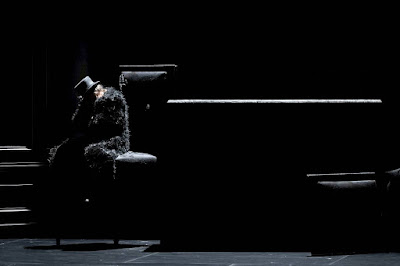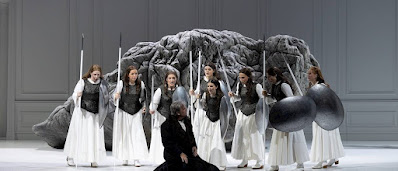Robert Ashley - The Bar, from Perfect Lives
Louth Contemporary Music Society, 2024
Gelsey Bell, Brian McCorkle, Paul Pinto, Dave Ruder, Aliza Simons, Amirtha Kidambi, Caoimhe Hopkinson, Sean Carpio, Steve Welsh
The Spirit Store, Dundalk - 15th June 2024
A performance of Robert Ashley's The Bar could in the context of the Louth Contemporary Music Society festival be considered a moment of light relief, a bonus extra in addition to the full performance of the composer's final opera Crash the previous evening, but it was also - as the performances at the Spirit Store in Dundalk are turning out to be - an essential and somewhat wayward element that contributes to the remarkable variety that is typical of Eamonn Quinn's programming for the LMCS's annual summer festival.
The second day of the 2024 two day festival opened with Linda Catlin Smith's Dirt Road at the church in St. Vincent's Secondary School. A seemingly austere, delicate, slow moving hour-long piece, the performance explored the interaction of violin and percussion with subtle variation and progression. The afternoon concert featuring Hamza El Din’s Escalay presented an extraordinary combination of Eastern meeting Irish traditional sounds, following on from an Irish traditional version of In C last year. A complete one-off, you only get this kind of thing in Dundalk, only at the LMCS. Before the immersive surround sound performance of Stockhausen's extraordinary Stimmung echoed around St. Nicholas church to close the festival however, we were invited to The Bar at the Spirit Store.
The Bar is just one section of a seven-part opera Perfect Lives that Ashley originally developed as an opera for television in 1983, back in the days when TV music programming was a little more adventurous (or existed even). As one of the more widely seen Ashley operas, Perfect Lives consequently has become almost a definite example of his style, although this is more extensively explored and expanded as it forms part of his Now Eleanor‘s Idea tetralogy. As far as Perfect Lives goes, it at least has that familiar rhythm and meandering philosophical exploration of ordinary people's lives in the Midwestern States of the USA.
"These are songs about the Corn Belt, the people in it, or on it." as Ashley narrates with variations of delivery and intonation for each section of the opera. The characters in Ashley's operas are all regular people, all have plans, but perhaps lulled by Ashley's own voice as the narrator in the recordings of his work, they seem to be subject to a kind of dream logic, getting distracted from their purpose through meetings with others, getting bogged down in details. Ashley's voice gives the impression of it just being a part of the way things go. In another work, Celestial Excursions, he explores how some old people talk endlessly, randomly, with a kind of verbal incontinence. These matters are of interest to the composer and recur in different forms in his work.
Words, as seen in Crash, have a musical quality of their own in Ashley's operas, in the abstraction of the texts, throwing out ideas that may or not be picked up later, that develop into a refrain and are echoed by a chorus. You can no more make sense of way the individual words and phrases fit together than you can 'explain' why one note follows another or how it adds up to create a narrative, and yet patterns emerge, elements connect. It just feels right. Language and communication are very much a part of what defines the character of his works.
The opera Perfect Lives revolves around two characters 'R', an Ashley-like figure and Buddy "The World's Greatest Piano Player", based on "Blue" Gene Tyranny, Ashley's musical collaborator. They arrive in a small Midwest town to entertain the locals at the Perfect Lives Lounge, but end up getting involved in an unusual kind of bank robbery where the money is just "borrowed" for a day. In Part 1. The Park, a man from country in hotel room in small Midwestern town pours a drink, picks up a phone and considers such philosophical matters as how can we pass from one state to another. In Part 2. The Supermarket we meet Helen and John who book adjacent rooms ("This is not very interesting, I know", the narrator admits). In Part 3. The Bank, Gwyn works at the bank. ("That's her job. Mostly she helps people count their money. She likes it.") Gwen is eloping to get married and takes day off work.
We come to Part 4. The Bar, where the star and a slightly seedy older man (Buddy and R) turn up on their day off at the Perfect Lives lounge and get into a philosophical conversation with the owner, Rodney. ("We don't serve fine wine in half pints, Buddy"). What happens in The Bar is no more enlightening or even entirely comprehensible than the previous sections (synopsis interpretations differ wildly), but there are familiar ideas that Ashley revisits in one form or another, such as the body having four ages (The Seed, the Root, the Trunk, the Branches), but also thinking about how we pass from one state to another. All of this is set to a music bar room Boogie-Woogie on piano, using preset rhythm templates derived from the Gulbransen 'Palace' organ.
As ever, there are much more complex ideas involved in Perfect Lives than the simple flowing and often abstract narration suggests. Improvement (Don leaves Linda), the first Ashley opera I discovered via a radio broadcast of a live performance in Vienna, another part of the Now Eleanor's Idea tetralogy, is described as "an extension 500 years later of the expulsion of the Jews from Spain in 1492 as an allegory for self-realisation". The stated purpose of Perfect Lives is 'Rebirth', or as I've seen it described "A banal road movie and at the same time a cultural-historical reappraisal of European-American mythology" and "a comic opera about reincarnation". As with Linda's surreal and comic encounters with an airline ticket sales person in Improvement having been abandoned by her husband Don at a service station, it's hard to match the verbal descriptions of everyday problems of ordinary people with such high-minded intentions.
The question of rebirth does float into view on occasion in those reflections on passing from one state to another and these questions come up time and again in Ashley's works, perhaps most specifically in Crash, which considers the average life as being divided into distinct 14-year periods. The music for the operas also appear to be far from the high concept technical exercises in musical virtuosity that you would expect from avant-garde opera. The dominant music in Perfect Lives sounds like jaunty keyboard rhythms that resemble pre-programmed organ tracks or synthesiser backing tracks, which when combined with the dry drawl of the abstract and digressive narration can prove to be hard to remain focussed on and yet fascinating in their flow. It might sound like basic Boogie-Woogie rhythms but the lightness is deceptive, the music clearly intended to evoke an almost trance like state, while being more complex than it appears to be on the surface.
If there are numerous levels and ideas to be teased out of Ashley's Perfect Lives, the Varispeed Collective have their own unique interpretation when bringing The Bar to a live audience, preferably putting it on at a bar. Rebirth not so much, this version is all about the Boogie-Woogie. And at the Spirit Store pub in Dundalk, which is also a notable music venue in the town, that means involving the locals, having a pint of Guinness and having fun. This is not the time for any deep probing of the philosophical content of Perfect Lives, or even the content of this section of it. And you can't really fault them for that, choosing instead to contribute to the wonderful, almost unimaginable range of what Eamonn Quinn has in mind for the LCMS annual celebration of contemporary music.
Ashley's characteristic cadences and dry midwestern drawl are almost impossible to imitate, at least with the particular emphasis he brings to his own words. The composer recognised however that it's necessary for performers to bring something of themselves to a performance, and they certainly did that at the Spirit Store in Dundalk. Neither can you or would you want to replicate the musical rhythms of "Blue" Gene Tyranny. The piano bar room boogie is taken up by Brian McCorkle and Paul Pinto from the Varispeed Collective, the main vocal duties shared between Aliza Simons, Dave Ruder, Gelsey Bell and Amirtha Kidambi special guesting as Rodney, alternating also to provide the chorus backing vocal reactions and interjections, all getting down in the spirit of the boogie.
It's part of the spirit of the Varispeed Collective's arrangement of site specific performances of The Bar not just to perform it in a suitable location - and the venue at the Spirit Store could not be more perfect - but also involve local musicians. That's a philosophy that also fits perfectly with the philosophy of the LCMS, and what makes their festivals unique, celebratory and inclusive. Caoimhe Hopkinson on bass, Sean Carpio on drums and Steve Welsh on saxophone all joined in with the unique character of the work and the performance. This was a very different interpretation then from the familiar Robert Ashley version, and it would be hard to define it as opera in any classical sense, but you could say that about any Ashley opera. As an element of the LCMS however, who hold to no rules or narrow definition of what contemporary music should be, it was just perfect. Lovely music indeed.
External links: Louth Contemporary Music Society, Lovely Music, RobertAshley.org




















